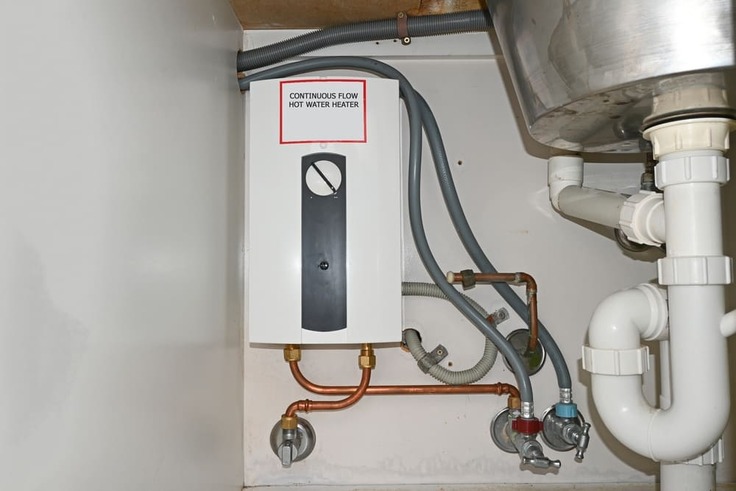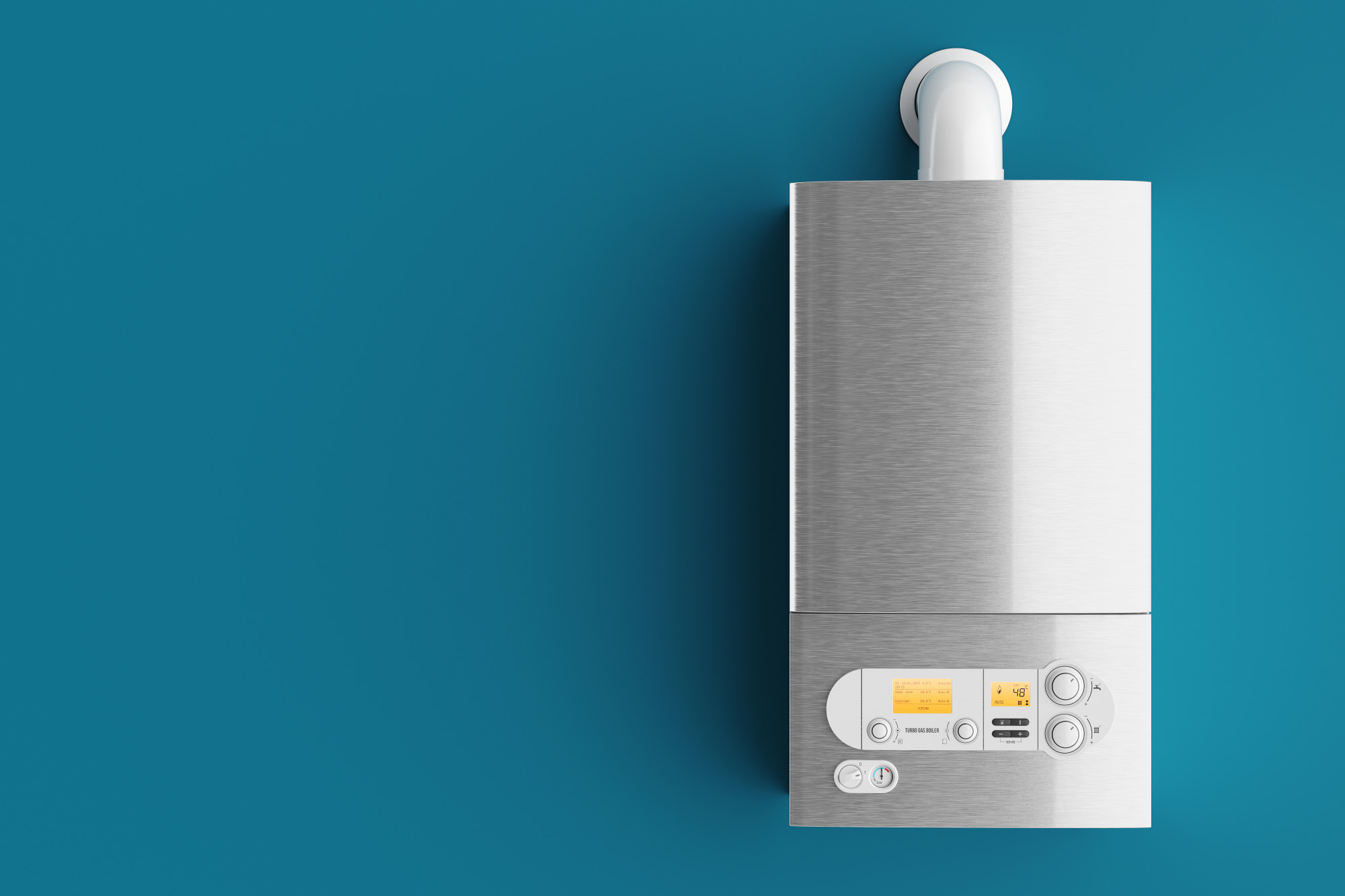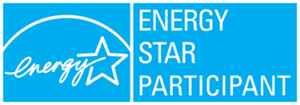✔ Expert-reviewed for accuracy and completeness.
Did you know that about 20 percent of your home’s energy expenses are going to heat your water? This is a considerable chunk of change and one you may want to consider more closely if your water heater is over a decade old.
Whether you’re looking to upgrade an older tankless water heater or switch from a storage system to tankless, this buyer guide will help you decide which make, model, and style is right for you.
We’ll go over important things like sizing, fuel sources, the benefits of tankless, how to compare efficiency, common warranty terms, potential rebates, and things you have to consider before settling on the right make and model for your home.
What Is a Tankless Water Heater?
Traditional tank hot water heaters keep a large volume of water heated constantly so that it is available as needed. Tankless water heaters, on the other hand, heat the water on-demand.
In other words, tankless water heaters generate hot water as needed whenever you turn on a hot tap in your house, be that a shower, a kitchen faucet, a utility room tap, or when you run the dishwasher or washing machine.
Moreover, this type of water heater can be more efficient and can also provide virtually limitless hot water, unlike a storage system, which may temporarily run out when your home’s water demands are high (like taking a really long shower).
6 Reasons to Upgrade to a Tankless Water Heater
There are indeed lots of reasons to get excited about installing a new tankless water heater for your home and here are just a few of them:
- They Save You Money – A tankless water heater doesn’t use energy throughout the course of the day when no hot water is being called for. Traditional storage water heaters rely on a reservoir tank, and this tank is heated periodically so that when you do need hot water, it can supply it. However, what if you’re not home all day? Tankless models heat water only when it’s needed, so no extra energy is wasted when you don’t need hot water.
- They Provide Nearly Limitless Hot Water – Since the water that passes through a tankless unit is heated on demand and fed from your water main, you can rely on nearly unlimited hot water. Tank-style heaters can only supply you with the amount of hot water that fits inside the tank, but advanced tankless water heaters can supply you with enough hot water to last for several consecutive lengthy showers, for example.
- They Won’t Burst – Although rare, it can happen with ordinary storage water heaters. Since there is no tank incorporated into a tankless water heating system, there is no danger of one bursting and flooding part of your house.
- They’re Space Efficient – Tankless water heaters are by and large much smaller than traditional units, which makes them ideal for smaller homes where storage and free space are at a premium.
- Quicker Access to Hot Water – Because of their compact size, some tankless units can be installed in a closet or pantry close to the actual faucets. Traditional water heaters are generally installed in the basement next to the furnace, meaning you have to wait for the water to cycle through the pipes before it reaches the faucet or shower. Also, if your bathrooms are far apart, you could install a smaller unit in each bathroom so hot water is available right away.
- Less Maintenance – Storage tank water heaters require regular maintenance, and that includes things like:
- Testing the temperature-pressure-release valve
- Draining the tank to get rid of sediment
- Inspecting the anode rod
- Maintaining insulation
Tankless water heaters do still need some TLC, but it’s not as labour-intensive as with storage water heaters. This is especially true of electric models, which have very low maintenance requirements.
Get Quotes
How soon are you looking to buy?*



How Much Do Tankless Water Heaters Cost?
Tankless water heaters are more expensive than storage water heaters, and the units alone can cost anywhere from $1,000 to $3,000. The final price will likely be in the $2000 – $4500 range including installation.
However, the final cost will depend on lots of things, including:
- The brand and model
- Flow rate (‘size’ of the unit)
- Natural gas/propane versus electric
- Potential installation complications
- Additional features and technologies
While you might pay more upfront to purchase a tankless water heater, you could save that and more in the long run thanks to lower energy bills, especially if you opt for a high-efficiency model. And you get the extra convenience of endless hot water on demand.
And don’t forget to check for available rebates before you buy to see how you could save on your upgrade.
Potential Rebates for Tankless Water Heaters
Tankless water heaters might be more expensive than their storage counterparts, but there are often great rebates available that can help you save.
Rebates worth up to $1,000—which sometimes include free installation too—are often available through:
- Utility companies
- Local HVAC contractors
- Water heater manufacturers
- The federal or provincial government
- Energy and environmental organizations
- Banks and financial institutions
Measuring and Comparing Tankless Water Heater Efficiency
Like furnaces and air conditioners, modern tankless water heaters come in a range of efficiencies. Buying a high-efficiency model can reduce your energy or fuel consumption and lower your energy bills. Water heater efficiency is measured in a few ways, including:
- Standby loss
- Energy factor
- Uniform energy factor
Standby Loss (Electric Models)
Standby loss is sometimes used to measure the efficiency of electric tankless water heaters. The lower the standby loss in watts, the higher the efficiency.
Energy Factor (Gas, Propane, and Electric Models)
There are two calculations that can be used to measure the efficiency of any tankless water heater, and the first is energy factor.
Energy factor, or EF, is very similar to the AFUE rating on furnaces or the SEER rating on air conditioners. EF compares how much fuel/electricity the water heater uses with how much hot water it produces. The higher the EF rating, the better the efficiency.
Uniform Energy Factor (Gas, Propane, and Electric Models)
UEF, or uniform energy factor, is a more recent efficiency measurement for water heaters. Because it’s more accurate than EF, it’s becoming the industry standard.
UEF is also based on energy consumption versus hot water generated, but it also incorporates other important calculations, such as how much hot water a unit can produce in one hour when it starts with a full load of water. This is called the first-hour rating.
Higher UEF ratings indicate better efficiency.
Features and Technologies to Consider
Modern tankless water heaters have a lot more to offer than just heating up your domestic hot water, and manufacturers have been focusing on improving technologies, developing features, and adding perks to make their brands more competitive. Here’s a glance at some of the features you might like:
- High-efficiency and ENERGY STAR® certified models
- Condensing technology
- Wi-Fi compatibility for remote control
- Wired remote controls
- Recirculation pumps
- Preheating technology
- Low NOx emissions
- Modulating burners
- Digital displays
ENERGY STAR Certification
One of the easiest ways to ensure you’re getting a high-efficiency and high-performance tankless water heater is to look for ENERGY STAR certification. This tells you the model has been tested and is guaranteed to meet high-efficiency standards.
Natural Resources Canada estimates that ENERGY STAR certified tankless water heaters use an average of 30 percent less energy than storage water heaters, and that will translate to great cost savings over time.
Most of the ENERGY STAR electric tankless water heaters on the market have UEF ratings between 2.3 and 4. Gas tankless water heaters must have an EF of at least 0.90, or a UEF of at least 0.87.
Another benefit of ENERGY STAR models is they may be eligible for additional rebates that non-certified models don’t qualify for.
Learn more about ENERGY STAR certification and what it means here.
Condensing Technology
Many tankless water heaters use heat exchangers to heat water on demand. There are also models available that have secondary heat exchangers, and these are called condensing tankless water heaters.
Condensing models might be more expensive, but they’ll also be more efficient because they have the secondary heat exchanger to recover heat and energy that would otherwise be lost through venting.
Wi-Fi Compatibility
One of the coolest things about modern HVAC equipment is that it can be made Wi-Fi compatible. That means you can use devices like smartphones, tablets, and other smart technology to control and manage your water heater settings remotely, and that includes:
- Adjusting the water temperature
- Monitoring water use
- Keeping an eye on fuel consumption
- Setting the unit to vacation mode
- Getting maintenance updates
Recirculation Pumps
Tankless water heaters provide hot water on demand, but there is still a short lag between turning on the tap and getting your hot water, especially when you’re farther away from the heater.
Recirculation pumps reduce waiting time and are particularly useful in homes where the distance between the heater and the point of use is more than 50 feet.
Get Quotes
How soon are you looking to buy?*



Smart Preheating Technology
Another way some manufacturers reduce lag time between turning on the tap and getting hot water is with smart technology that tracks peak use times and ensures hot water is already there to meet your demands during those times.
Low and Ultra-Low NOx Emissions
Some tankless water heaters have been engineered with special technologies to reduce nitrogen oxide emissions. These models are better for the environment, and they meet strict NOx emissions standards for homes in municipalities that have air quality controls in place.
Modulating Burners
A tankless water heater with a modulating burner will adjust the burner to meet your demands and save as much energy as possible.
For example, if you only have one faucet demanding hot water, then the burner will reduce its output to save energy. The burner output will only increase as your hot water needs go up, so the unit will save energy and money.
Digital Displays
A digital display on the water heater might not be as fancy as Wi-Fi compatibility, but it still makes operating and monitoring your water heater convenient. A remote digital display connected by wire may be available.
Depending on how high-tech the display is, it might let you:
- See and change the temperature
- Set different modes
- Keep an eye on the flow rate
- Check the water pressure
- See maintenance requirements
- Check self-diagnostics for performance and issues
Potential Drawbacks of Tankless and How to Avoid Them
There are far more advantages to tankless water heaters than there are disadvantages, but it’s important to consider the cons before switching so you can take steps to avoid them.
Potential Drawback: Limited Flow Rate
First of all, tankless water heaters do have a finite flow rate, meaning they can only generate so much hot water at a time. For instance, if you have two people showering at the same time, another person doing dishes, and a fourth doing laundry, then the water heater might not be able to keep up with demand.
The Fix: Get the Right Size
Fortunately, there’s an easy way to avoid this problem, and that is making sure you size the tankless water heater properly for your home and your needs (more on that later).
Potential Drawback: Higher Purchase Price
Tankless water heaters do tend to cost more than storage water heaters, and there’s simply no way around this. But you can offset the cost in other ways.
The Fix: Saving Money Elsewhere
While tankless water heaters are more expensive, you will save money in the long run on energy bills because tankless water heaters are more efficient. You might also be able to save on the purchase price by finding rebates, looking for sales, and shopping around for the best prices.
Potential Drawback: Higher Installation Costs
Tankless water heaters can be expensive to install compared to storage tank water heaters, and this is because they often use pipes that are a different diameter and have special ventilation requirements.
The Fix: Find the Right Contractor
We definitely don’t recommend trying to save money by installing a tankless water heater yourself, but you can shop around to find a local HVAC contractor who has the right tools, the right knowledge, and the right price.
Use our independent contractor certification program to find HVAC specialists nearby, or get a free quote today.
Sizing Your Tankless Water Heater Accurately
We’ve already mentioned what can happen if your tankless water heater doesn’t have a large enough flow rate for your needs, so now it’s time to talk about how to size your water heater properly.
Tankless water heaters are sized based on flow rate, which is measured in gallons per minute (GPM). To get an idea of what size water heater you need, start by adding up the flow rate (in GPM) of the water-using fixtures and appliances in your home. Don’t forget to include:
- Faucets
- Showerheads
- Dishwasher
- Washing machine
For example, if you have one shower with a 2.5-GPM flow rate, three faucets with a 1-GPM flow rate each, and a washing machine with a flow rate of 3 GPM, then you can start to look at water heaters with flow rates in the ballpark of 8.5 GPM.
However, there are other factors that must be considered when sizing a tankless water heater, including temperature rise. That’s the difference between the temperature of the water coming into the system versus the desired temperature of your hot water (this is usually 120 F maximum).
Because sizing a tankless water heater properly is part math and part art, your best bet is to have it properly sized by a professional HVAC technician.
Comparing Fuel Options for Tankless Water Heaters
One decision you’ll have to make when buying a tankless water heater is what fuel to use. This type of water heater is available in natural gas or propane and electric models. There are pros and cons to the different fuel sources, so it’s important to weigh your options carefully.
| Consideration | Pros | Cons |
|---|---|---|
| Installation | Electric: Water heaters that are powered by electricity tend to be cheaper to install because they don’t need specially sized pipes for gas hookups, and they don’t have ventilation requirements. | Gas: Natural gas and propane water heaters are more expensive to install because of the additional venting requirements and the special gas hookups. |
| Efficiency | Electric: Electric models are also significantly more efficient than gas or propane ones. As we saw earlier, some electric models with ENERGY STAR certification can have UEF ratings as high as 4. | Gas: These models aren't as efficient as electric tankless water heaters. Some of the most efficient ENERGY STAR models still only have UEF ratings of 0.97 percent, compared to the 4 rating of some electric models. |
| Energy Costs | Gas: Natural gas and propane tend to be cheaper than electricity, and this can result in lower energy bills for a tankless water heater powered with gas. | Electric: Despite their higher efficiency, electric models can still be more expensive to operate because electricity tends to be pricier than gas or propane. |
| Flow Rate | Gas: Whereas electric tankless models have limited flow rates, gas and propane ones can accommodate homes with much higher hot water demands. Some gas models can even deliver flow rates as high as 11 GPM. | Electric: Depending on your hot water needs, an electric tankless system might not be sufficient because these models tend to have lower flow rates than gas ones. One of the highest flow rates available for an electric tankless water heater is 8.8 GPM, but most of them are much lower than that. You might need more than one electric tankless to meet your needs. |
| Lifespan | Gas: You can usually tell by a warranty how long you can expect a water heater to last (more on that later). Gas and propane models have much longer warranties than electric models, meaning you can expect them to withstand several more years of use. | Electric: Tankless electric models tend to have significantly shorter warranties, and this can indicate shorter lifespans. |
Outdoor Tankless Water Heater Options for Milder Climates
Tankless water heaters come in both indoor and outdoor models.
Outdoor tankless water heaters aren’t typically practical in Canada. These units do have built-in freeze-prevention devices, but they will use a great deal of energy during our long, cold winters. Moreover, the outdoor pipes must be carefully insulated to prevent freezing.
However, if you live somewhere with milder winters, like Vancouver Island, then you could consider an outdoor tankless water heater.
There are a few advantages to outdoor models, including additional space-saving, and cheaper and faster installation because you don’t have to worry about ventilation.
3 Important Questions to Help You Determine if Your Water Heater Is Due for an Upgrade
How Old is Your Tank?
You can usually find out the age of your water heater by checking the sticker on the side. It should have the name and number of the contractor who installed it and the unit’s serial number. Once you have these, a simple phone call will tell you all you need to know about the age of your water heater.
Are You Satisfied with Its Performance?
Are you getting the hot water you need? Sometimes all it takes to make your water hotter is a simple adjustment of a valve, but if you have already maxed out the capacity of your water heater, then it may be time to consider an upgrade.
Are You Paying Too Much?
Take a look at your energy bills. Have they been steadily rising over the past months or years? The culprit could be your old, inefficient water heater.
If you answered old, no, and yes to these questions respectively, then a tankless water heater might be able to solve all of these issues.
Common Warranty Coverage for Tankless Water Heaters
Warranties are something you will definitely want to consider when buying a tankless water heater, especially when you think about the additional up-front cost of buying a tankless model.
Longer warranties can save you plenty on maintenance and service costs over the years, but they can also give you a good idea of how long you can expect your new water heater to perform reliably and optimally.
The warranty terms you get with your tankless water heater will depend largely on the brand and style. Electric models have much shorter warranties than natural gas or propane ones, but some brands offer longer terms than others.
Here are some common warranty terms to look for when you’re shopping:
| Warranty | Electric | Gas/Propane |
|---|---|---|
| Heat Exchanger | 5 years | 10 to 15 years |
| Parts | 1 year | 5 years |
| Labour* | N/A | 1 year |
*Labour warranties aren’t common with tankless water heaters, but some brands do offer them.
Our local dealers would be happy to answer your questions regarding particular models, installation, or tankless water heaters in general.
Tankless Water Heaters and the Importance of Professional Installation
We already mentioned that installing a tankless water heater—especially a gas or propane model—can be more complicated than with storage water heaters, and this is just another reason it’s so important to trust the installation to a professional.
Beyond that, tankless water heaters can be pricey, and proper installation ensures optimal performance and peak efficiency, meaning you’ll get the most out of your investment.
Another reason professional installation is important is your warranty: many terms dictate that installation must be performed by an expert HVAC technician, otherwise you risk voiding your warranty.
Which Brand of Tankless Hot Water Heater is Best?
While the first place you should start when considering a tankless water heater is the needs of your household, you should also be mindful of the brands and models that different manufacturers offer.
Rheem, Navien and Stiebel are among the most popular tankless water heater brands in Canada, but there are many others to check out as well, including:
- GSW
- Bradford White
- Whirlpool
- Rinnai
- Giant
- Takagi
- John Wood
- Bosch
- AO Smith
- GE
Sources
- Water Heaters
- Understanding Energy Efficiency in Water Heaters
- Sizing a New Water Heater
- Tankless water heaters
- ENERGY STAR Certified Water Heaters
Get Quotes
How soon are you looking to buy?*











